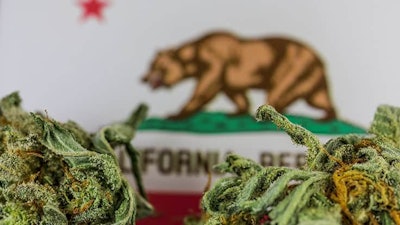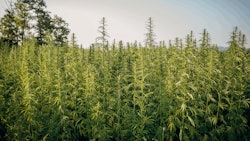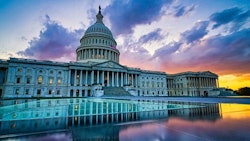
Editor's note: This story was updated Sept. 13 with a new statement from NIHC.
Assembly Bill 45, a recently amended hemp bill in California that garnered support from Gov. Gavin Newsom, has passed the state legislature and now heads to the governor’s desk to be signed into law.
The recent amendments to the bill were meant to eliminate one of its most contentious aspects: a ban on smokable hemp.
But even with its newest amendments, the bill has drawn intense criticism from several industry organizations, including the National Industrial Hemp Council (NIHC), the California-based Hemp Farmers Guild, and the California Hemp Coalition.
Critics of the bill say its language is murky at best. And while the most recent amendments eliminated mention of “smokable” hemp prohibition, they replaced it with language that, by some interpretations, could mean nearly the same thing.
“Manufacture or sale of inhalable products is prohibited. Manufacture of inhalable products for the sole purpose of sale in other states is not prohibited,” the bill reads, providing no further definition of “inhalable products.”
“We can’t tell if ‘inhalable’ includes ‘smokable’ because there’s no definition,” says Josh Schneider, president of the Hemp Farmers Guild and CEO of Cultivaris Hemp.
READ MORE: Smokable Hemp Ban Removed From California Bill
It’s not the only aspect of the bill that could create confusion within the state’s industry, Scheider and other industry organizations say. The bill contains several other aspects that, according to analysis from the NIHC, could be detrimental to the state’s farmers and cost California’s economy hundreds of millions of dollars annually.
“The bill is so poorly drafted with such messy and imprecise language that it is my opinion that it will spawn lawsuits like crazy,” Schneider says.
Smokable Hemp in Question
Despite the bill saying “inhalable products” are prohibited in the state—unless they are being manufactured to sell out of state—it later goes on to lay out regulations for inhalable products. Some of these include an age limit of 21 or older for those who may purchase inhalable products, as well as prohibitions on what these products may contain (such as vitamin E acetate or flavorings).
“This article shall become operative upon the effective date of a measure passed by the Legislature that establishes a tax on inhalable products and states the intent of the Legislature to fulfill the requirements of this section,” the bill states.
Schneider says he, along with the help of attorneys, interprets the bill to state that inhalable products will not be permitted for sale until the state legislature establishes a tax rate on these products. The bill does not establish a timeline for tax implementation.
“California is treating [hemp] as THC cannabis and going to force it through that system,” Schneider says.
Redefining THC Limits
Schneider says A.B. 45 not only requires additional testing for hemp, but also implements tetrahydrocannabinol (THC) limits that are stricter than those at the federal level.
The Agriculture Improvement Act of 2018 (the 2018 Farm Bill) defines hemp as all parts of the cannabis plant “with a delta-9 tetrahydrocannabinol concentration of not more than 0.3 percent on a dry weight basis.”
The U.S. Department of Agriculture’s final rule dictates hemp be tested prior to harvest for its “total THC” levels, which is defined as delta-9 THC plus tetrahydrocannabolic acid (THCA).
A.B. 45, however, says total THC in final products may not exceed 0.3% THC—a more stringent requirement than the 0.3% delta-9 THC limit required for final products by the farm bill.
“This sets an impossible-to-meet standard for final form products that is much more severe than federal law,” Schneider says. “Even if we were still allowed to sell smokable hemp, if this was the standard, nobody would be able to comply. … Under A.B. 45, they’ll have to ship it out of the state, period.”
What’s more, the bill also appears “to prohibit the sale of most whole-plant hemp products, even though they are not subject to abuse, not controlled substances, and not prohibited under Federal law,” according to a written analysis by NIHC.
The organization writes: “11920(l) apparently defines ‘THC or comparable cannabinoid’ as including THCA and any other cannabinoids deemed by the Department to be necessary for inclusion, except CBD; while 11921(a)(1) appears to prohibit the sale of final products containing hemp extract that exceeds 0.3% THC, as defined above. Since most whole-plant extracts and infusions contain non-impairing cannabinoids such as THCA, CBG, CBC, etc. in concentrations greater than 0.3% (as do minor-cannabinoid extracts), products made from them would be prohibited from sale even though they conform with Federal law requiring products to contain not more than 0.3% [delta-]9-THC.”
Where Hemp and Cannabis Collide
A.B. 45 also states that: “On or before July 1, 2022, the department shall prepare a report to the Governor and the Legislature outlining the steps necessary to allow for the incorporation of hemp cannabinoids into the cannabis supply chain. The report shall include, but not be limited to, the incorporation of hemp cannabinoids into manufactured cannabis products and the sale of hemp products at cannabis retailers.”
“It seems to deliver the entire system into the hands of the THC dispensaries,” Schneider says.
Bill Draws Criticism
Industry organization U.S. Hemp Roundtable was a major proponent of the bill, and the organization’s general counsel, Jonathan Miller, recently expressed excitement for the bill’s passage.
“After more than three years of stops and starts and difficult negotiations, the era of CBD prohibition in California will soon be over," Miller said in a press release. “Retailers and product manufacturers will no longer have to fear embargoes and product seizures. Consumers will have access to products that promote their health and wellness. And most importantly, California hemp farmers will see a wide opening of opportunity for their crops, as the nation’s largest wellness market is now open for sale.”
But the bill, which opponents say contains several other confusing and contentious aspects, has drawn criticism from a range of other organizations.
READ MORE: California Hemp Association Pushes Back on Proposed Flower Ban
“The California Hemp Coalition and our members have sent letters to all members of the California legislature to inform them that AB-45 is a bill that has been created with no input, or consultation with us, or any California hemp farmers, business people, workers, and consumers that we know,” says a press release from the organization. “It is largely a creation of paid lobbyists from the marijuana industry, big out-of-state CBD marketing companies, and a few politicians that are either mistaken or uninformed. AB-45 bill is so bad that it is beyond the point where it can be amended and improved.”
With Newsom recently expressing his support for the bill, it is expected to pass.
A.B. 45 contains an emergency provision, which means it will take effect as soon as the governor signs it.
“...[T]he prohibitions appear to take immediate effect, resulting in severe damages this season to the many California farmers that have invested their toil and their money in planting a smokable hemp crop for the California market, only to discover—just before harvest—that the crops they planted for sale in the world’s largest market for their products are suddenly to become prohibited from sale there now,” NIHC writes. “This raises serious questions of legality, not to mention fairness.”
Despite its criticism, NIHC spokesman Larry Farnsworth said in a written statement that California "should be commended for recognizing and taking action to provide a regulatory framework for hemp and hemp products when the FDA has not done the same on the issue of CBD."
"Our concern has always been and remains today, to represent all facets of our industry to create a hemp economy that works for everyone. While this is a win for the hemp industry as a whole; farmers do lose in this legislation," Farnsworth said in the statement. "The NIHC believes this to be a relatively simple fix if the California state legislature makes it a priority to come up with the tax structure so smokable hemp can be sold. We stand ready to work with state of California to create policy that protects farmers and ultimately, gives consumers a choice in how they consume hemp."
Schneider says some farmers he works with no longer plan on harvesting their crop now that the future of the market is unclear.
“We don’t have an idea of what the legislative intent truly is. The last thing farmers can handle is a bunch of fines on top of their already thin margins,” Schneider says. “I think it definitely puts a question mark over the future of growing hemp flower in California.”






















